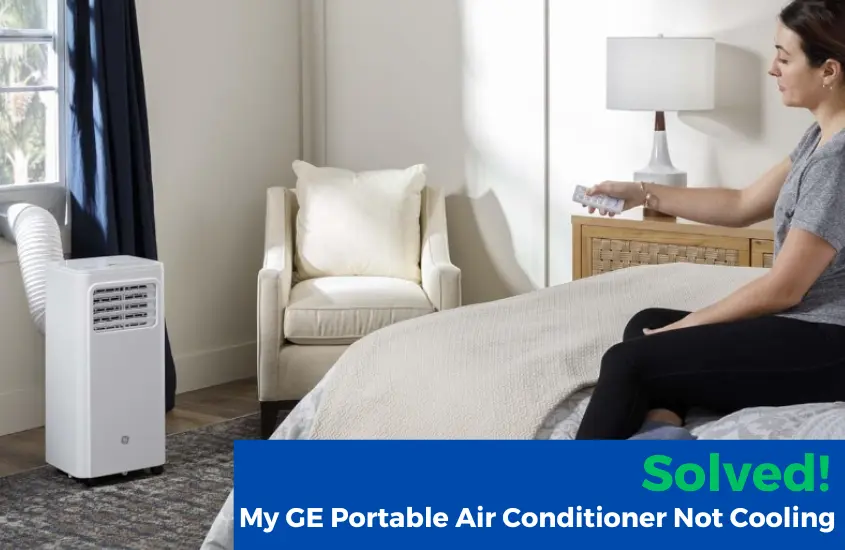A GE portable air conditioner is often hailed as a versatile and efficient solution for keeping indoor spaces cool during scorching summer days. However, frustration can arise when your trusted cooling companion fails to deliver its promised chill.
One of the primary reasons for this cooling conundrum is dirty condenser coils. If the coils are significantly dirty, the air conditioner will not be able to maintain the proper temperature, and the compressor will run continuously in an attempt to cool the room.
In this article, we’ll explore common reasons why your GE portable air conditioner may not be cooling as expected and provide troubleshooting tips and solutions to help you regain that much-needed comfort.
Most Common Reasons for Inadequate Cooling in GE Air Conditioners
Inadequate cooling in GE air conditioners can be attributed to various factors. Here are some of the most common reasons for inadequate cooling in GE air conditioners:
1. Dirty Air Filter
A clogged or dirty air filter restricts airflow, reducing the air conditioner’s cooling efficiency. It is essential to regularly clean or replace the air filter as the manufacturer recommends.
2. GE Air Conditioner User Control and Display Board Issues
Problems with the control panel and display board can result in incorrect temperature settings or operational issues, leading to inadequate cooling. Issues may include faulty sensors, buttons, or digital controls.
3. Dirty Coils
Both the evaporator (indoor) and condenser (outdoor) coils can become dirty or blocked with debris, reducing the AC’s ability to transfer heat effectively. Regular coil cleaning or maintenance is essential.
4. GE Air Conditioner Faulty Dual Run Capacitor
The dual run capacitor is responsible for starting both the fan motor and compressor. If it fails, it can result in poor cooling performance or even a non-operational AC.
5. Compressor Problems
A malfunctioning compressor can significantly impact the cooling capacity of the air conditioner. Issues may include electrical problems, motor issues, or refrigerant-related problems.
6. Thermistor Malfunction
The thermistor is a temperature sensor that helps regulate the cooling process. If it malfunctions, it can result in inaccurate temperature control and inadequate cooling.
7. Control Board Issues
The control board is the brain of the air conditioner, coordinating the various components. Problems with the control board can lead to erratic or inefficient operation.
8. Temperature Control Thermostat Problems
If the thermostat is not functioning correctly, it may not accurately detect or respond to temperature changes, leading to inadequate cooling.
9. Run Capacitor Issues
In addition to the dual run capacitor, air conditioners may have a separate run capacitor for the fan motor. If this capacitor fails, it can affect the fan’s operation and cooling efficiency.
10. Dual Shaft Fan Motor Problems
The fan motor circulates air through the system. If the motor fails, it can result in poor air distribution and inadequate cooling.
11. Fan Motor Issues
Issues with the fan motor, such as motor failure or worn-out bearings, can lead to reduced air circulation and poor cooling performance.
Addressing these common issues through regular maintenance, professional servicing, and timely repairs can help ensure that your GE air conditioner operates efficiently and provides adequate cooling.
Maintenance Tips to Prevent Cooling Issues For GE Portable Air Conditioner
Proper maintenance is crucial to prevent cooling issues and ensure the efficient operation of your air conditioner. Here are some maintenance tips to help you keep your cooling system in top condition:
1. Regularly Clean or Replace the Air Filter:
Clean or replace the air filter as recommended by the manufacturer. A clogged filter restricts airflow and reduces cooling efficiency.
2. Clean the Coils:
Clean the evaporator and condenser coils to remove dirt, dust, and debris that can hinder heat exchange. Use a coil cleaner or consult a professional for coil cleaning.
3. Keep the Surrounding Area Clear:
Ensure that the area around the outdoor unit is free from obstructions such as vegetation, debris, or other objects. Proper airflow around the condenser unit is essential for efficient operation.
4. Inspect and Clean the Drain Line:
Check the condensate drain line for clogs or blockages. Clear any obstructions to prevent water leakage and mold growth.
5. Check and Tighten Electrical Connections:
Inspect electrical connections and tighten any loose wires, terminals, or connectors to prevent electrical issues.
7. Lubricate Moving Parts:
If your air conditioner has moving parts, such as the fan motor, lubricate them as needed according to the manufacturer’s recommendations.
8. Inspect and Clean the Fan Blades:
Check the fan blades for dirt and debris. Clean them if necessary to ensure optimal airflow.
9. Test the Thermostat:
Verify that the thermostat is functioning correctly and accurately detecting temperature changes. Calibrate or replace it if needed.
10. Inspect the Refrigerant Lines:
Ensure that the refrigerant lines are insulated and free from damage. Leaks can lead to a loss of cooling efficiency.
11. Schedule Professional Maintenance:
Arrange for an annual or bi-annual professional HVAC maintenance service. Certified technicians can identify and address issues that may not be apparent during routine inspections.
12. Monitor Airflow and Air Quality:
Ensure that vents and ducts are free from obstructions. Additionally, consider using indoor air quality products, such as air purifiers, to maintain healthy and clean air.
13. Program the Thermostat:
Utilize programmable thermostats to create energy-efficient cooling schedules. Adjusting the temperature when you’re away or asleep can save energy and improve comfort.
14. Consider Installing a Smart Thermostat:
Smart thermostats allow for remote control and monitoring, enabling you to adjust settings and receive alerts on your smartphone.
By addressing these troubleshooting steps and solutions, you can significantly improve the cooling performance of your GE portable air conditioner. Remember that regular maintenance and cleaning are essential to keep your unit running efficiently and providing the cool and comfortable environment you desire.
If you encounter issues that you can’t resolve on your own, don’t hesitate to seek professional assistance to ensure your air conditioner operates at its best.

